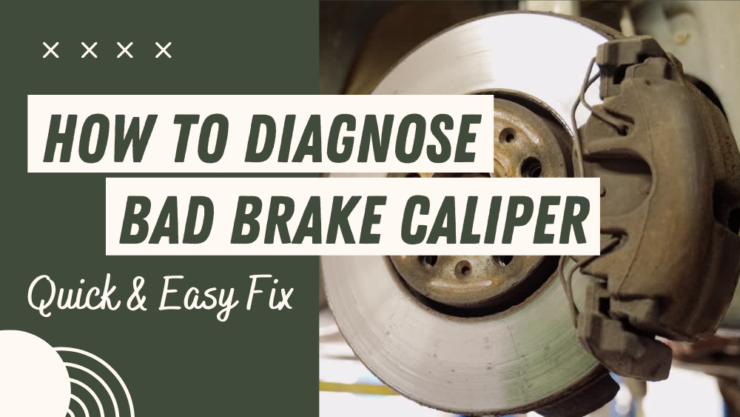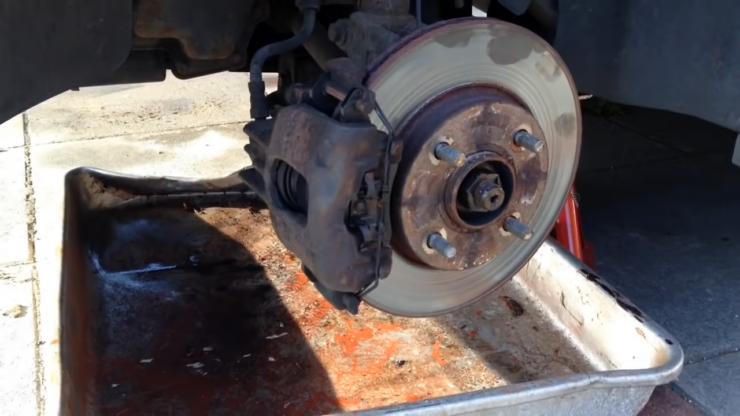It is common for many people to go to a mechanic explaining that they have problems to brake their vehicle, thinking that they should change the whole system, when the problem may be just the brake caliper.
Hence, the importance of knowing how to diagnose a bad brake caliper, so here we will give you the answer to this and many more questions on this subject.
Page Contents
What Are The Symptoms That The Brake Caliper is Failing?
The signals that show that the brake caliper has problems are the following:
Escape from brake fluid
When the brake calipers have problems it is normal to see how the brake fluid escapes, this, because the calipers work with the help of the pressure of that liquid.
Therefore, the master cylinder in which the tweezers operate has gums that allow the liquid does not escape, but over time, the wear, use, and heat generated by the constant braking rubber seals they release or lose pressure, causing the liquid to spill.
Pulling the car sideways
A vehicle with a good braking system and with the braking caliper in good condition brakes automatically when placing the foot on the brake pedal, but if the vehicle turns to the right or to the left when braking, that is a sign that the brake caliper is in bad condition.
This happens because the heat to which the brakes are subjected by friction can affect the grip capacity of the caliper piston.

In fact, a clamp piston with this problem cannot be retracted, consequently, there is a drag of the wheel when braking.
So, the car will pull or pull to the side where the clip is in poor condition.
Also, the driver will notice that one wheel is slower than another because of the impossibility of braking.
Rare sounds
Those who know their car very well, are very clear of the normal noises and the abnormal noises of their cars.
Hence, detecting that a pin brake is failing is simple, just listen to a sudden blow when braking to detect that there is a problem.
Regarding these noises, you have to be very alert, since a loose, tangled clamp or one that is not well attached to the braking system as well as reducing the service life of the brakes, can cause problems to stop the vehicle, which can generate a serious accident.
Vehicle vibration
If when braking the steering wheel vibrates or the brake pedal vibrates, it is necessary that it be attended to quickly, as it is a symptom of damage to the brake system that may be directly related to the brake caliper.
Causes By Which The Brake Caliper Can Be Damaged
The causes for which the brake caliper can be damaged can be very varied, among them are

Old brake fluid
The brake fluid must be replaced frequently; it is advisable to at least change it every 3 months.
The brake fluid that is not changed frequently does not fulfill its lubrication functions correctly, therefore, this generates the oxidation of the piston walls.
In turn, the brake fluid used absorbs moisture which is another cause of the corrosion of the piston walls.
In addition, the old fluid is dirty, dusty and can generate cracks in the braking system, which can also degenerate into damage to the piston.
Brake pads worn
Another reason why the brake caliper may be damaged is that the brake pads are not replaced.
The protection of the brake pads and consequently the protection of the brake pads are guaranteed brake caliper.
In turn, we must take special care in changing the brake pads to lubricate the pins, keep in mind that on these pins is that the caliper slides.
Therefore, it is necessary to always find sufficient lubrication to prevent dust and water from disturbing the braking capacity.
Deterioration of the brake caliper
The passage of time wreaks havoc on any mechanical piece.
And while it is important to maintain the brake system constantly, it is also important to check the brake caliper and consider replacing it if necessary.
Every mechanical part has its useful life, consequently, the brake caliper also.
So, depending on the use you give to your car and according to the year of the car, consider a review to the brake caliper.
Breakdown of the brake caliper
Just as a brake caliper wears out, it can also be damaged. Fortunately, today’s cars have sensors that can warn the driver of a problem in the braking system, which also implies the notice of a problem with the brake caliper.
Therefore, if your car issues an alert or lights a light on the dashboard that warns of a brake failure, do not hesitate to stop the vehicle immediately and contact your mechanic or trusted specialist.
So, if the fault is in the clamps, logically it will require a replacement of them.

Solutions to failures with the brake caliper
The solutions depend on the problem that occurs with these, among the possible solutions are:
- If the problem is queueing the brake fluid, you must replace it or put enough for the system to work properly.
- If the problem is with the master cylinder tires, they must be replaced so that there is no brake fluid leakage.
- If the problem is with the brake pads, they must be rectified or replaced so that they do not cause further problems affecting the calipers.
- If the problem is damage or deterioration of the clamps, the solution is definitely to replace them immediately.
- Check the braking system every 200,000 kilometers, thus avoiding future problems.
Frequent questions of How To Diagnose a Bad Brake Caliper
Why is a brake caliper stuck?
- Because of the humidity.
- Because of the dirt.
- For not using a good liquid or lubricant.
- By deformation of the own clamp of wear.
- Due to radical changes in temperature.
- For driving with worn pads.
- By exposing the car to chemicals or abrasives that reach the brakes.
What can I do to extend the life of the brake caliper?
- Do not drive abruptly and suddenly brake steadily
- Change the brake pads every 6 months
- Apply a special liquid to the clamp to make it more resistant to heat
- Applies anticorrosive liquids preventatively to the clamp
What can I do if the brakes fail in my car while I drive?
- Release and press the brake pedal continuously, this can reactivate the system and generate pressure
- Try to break the vehicle with the engine through the change of speeds
- It seeks to leave the road and enters the emergency braking zones
- Do not go to the hand brake quickly, you can lose control of the vehicle
- Never turn off the engine of the car so you will not stop your progress
Never forget to constantly check the brake caliper, this is an important element of the braking system, so always have it checked by a technician or specialist mechanic, in this way you can determine in time if you need maintenance or replacement.


